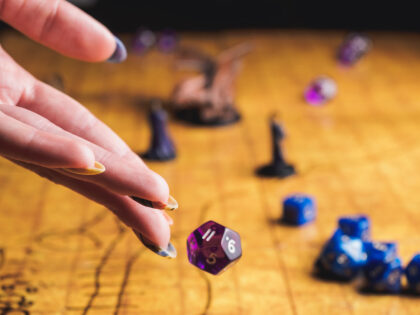I’ve been playing role-playing games with the same group of friends for several years. If you aren’t familiar with role-playing games, every player typically takes on the role of a fictional character in a story. They collaborate to tell the story, based on their character’s abilities, personality, and priorities. It’s kind of like improvising a play without a script, but with some boundaries in place about the setting and the narrative.
There’s often one person in a role-playing game who doesn’t play a single character in the story. This person holds the rest of the fictional world. Sometimes this special role is called the Dungeon Master or Game Master, or maybe the Keeper or Storyteller. This is the person at the table most responsible for establishing and maintaining the boundaries of the narrative. As such, it can feel like an intimidating responsibility.
During a recent game, a couple of the players’ characters launched into a lengthy interaction with one another. The conversation included all of the players to some extent, but the Game Master just sat as spectator. There was nothing for this individual to do, really. Our characters were engaged in deepening their bonds with one another, establishing a common sense of purpose, and recognizing how to cooperate more effectively based on what each person was able to contribute to that common purpose.
At the end of the session, we typically have a moment to reflect on how things went. One player praised the Game Master for letting that lengthy conversation happen between our characters. Some people would get nervous that they needed to influence things or interrupt with some urgent crisis that rushed the story forward. But this friend let the conversation run its course, and then picked up the next bit of action rather gracefully.
In response to the praise for giving us that space as players, the Game Master observed, “I trust you. I didn’t need to rush things along. What you were talking about seemed important. And we’ve been playing together a long time. I know you’re not going to run things off the rails.”
What an amazing thing. I don’t need to control what’s happening. I trust you. I know that we want the same thing and we’re all headed in the same direction.
Maybe it’s natural for that to happen with a group of people who have been engaging with a hobby for a number of years. Especially a hobby that invites some risk and vulnerability. And maybe there are some groups of people who never manage to foster that sense of trust, no matter how long they’ve been involved in a common activity.
Still, I hope that within our collective definition of Beloved Community, we’re able to include this sentiment. I trust you. I don’t need to control you. I know that we want the same thing and we’re headed in the same direction. And if I ever doubt that, I know we can talk through it and find our way together.
That’s not exactly what this friend said, but it’s along the same vein. I wonder what fosters that in a community of people, beyond just quantity of time spent together. I wonder what allows a person to look at another person—a community of people—and know what trust feels like.
Share this post:
